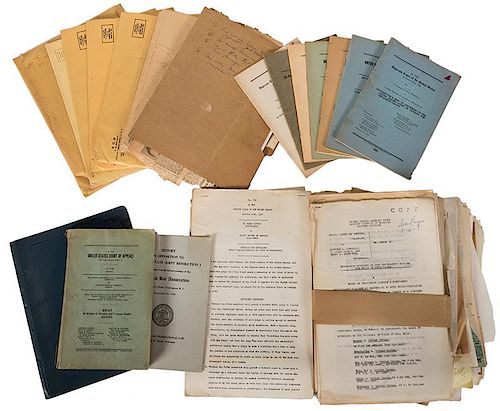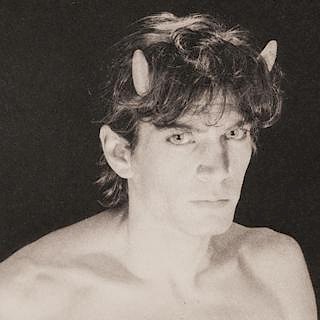Archive of Documents Pertaining to the Matthew J. Connelly Prosecution.
Lot 38
Categories
Estimate:
$1,000 - $2,000
Absentee vs Live bid
Two ways to bid:
- Leave a max absentee bid and the platform will bid on your behalf up to your maximum bid during the live auction.
- Bid live during the auction and your bids will be submitted real-time to the auctioneer.
Bid Increments
| Price | Bid Increment |
|---|---|
| $0 | $5 |
| $30 | $10 |
| $100 | $25 |
| $500 | $50 |
| $1,000 | $100 |
| $2,000 | $200 |
| $6,000 | $500 |
| $10,000 | $1,000 |
| $20,000 | $2,000 |
| $50,000 | $5,000 |
| $100,000 | $10,000 |
About Auction
By Potter & Potter Auctions
Jan 27, 2018 - Jan 28, 2018
Set Reminder
2018-01-27 11:00:00
2018-01-28 11:00:00
America/New_York
Bidsquare
Bidsquare : Fine Books & Manuscripts
https://www.bidsquare.com/auctions/potter-potter/fine-books-manuscripts-2916
Potter & Potter Auctions info@potterauctions.com
Potter & Potter Auctions info@potterauctions.com
- Lot Description
Archive of Documents Pertaining to the Matthew J. Connelly Prosecution. 1950s. Carton with documents approximately 6 inches thick, possibly thousands of pages pertaining to the prosecution of Matthew J. Connelly, including an unbound scrapbook with dozens of newspaper clippings, mostly in folders identified by year (1955/1960). Other documents include a group of letters and other original legal correspondence from his attorneys, Jacob and John Lashly, the civil rights attorneys from St. Louis, together with various motions, pleadings, briefs, many of them printed and bound. Some of these include a 176-page Appellate Brief, with separate appendixes, a second Appellate Brief, a Reply Brief, a Petition for Rehearing, all filed with the U.S. Court of Appeals. United States Supreme Court documents include a Petition for Writ of Certiorari, a Reply Brief, a Petition for Writ of Certiorari by co-defendant LaMar Caudle, and a Brief for the United States in Opposition. Present are a Sworn Statement by Harry Schwimmer, the attorney for Irving Sachs, the alleged co-conspirator, a Petition for Probation, Petition for Rehearing, various memoranda, Exhibits, Briefs, Income Tax Records and many others. The application for clemency is also included in this archive. Up to 9 x 13 ½”. Good. Matthew J. Connelly, President Truman’s Appointments Secretary, in a politically motivated prosecution, was indicted on a charge of conspiracy to defraud the United States government on December 1, 1955. It was alleged that he and others, in 1949, had attempted to interfere in a tax evasion charge against Irving Sachs, a St. Louis businessman. Mr. Connelly was alleged to have received an oil lease with a value of under $4,000, for which he paid $850.00. After a lengthy delays the matter went to trial, the defendants were convicted, and as the trial judge was entertaining a Motion to Set Aside the Jury Verdict he was found shot to death. The defense argued that the Judge was about to rule in the Defendants’ favor, when, due to the burdens placed upon him by the trial, he committed suicide. The U.S. Court of Appeals then denied a Motion for New Trial and assigned a new judge to sentence the Defendants rather than granting a Motion for New Trial. Mr. Connelly was sentenced to two years in prison. Throughout this prosecution, sentencing, appeals process and for years thereafter, former President Harry S. Truman stood by Mr. Connelly, and called his conduct “above reproach.” In 1959, Mr. Truman was the headline speaker at a fund raising dinner that was held to honor Mr. Connelly, and which raised $150,000.00 to cover some of his legal expenses. The case wound its way through the Federal Courts ending before the U. S. Supreme Court, which refused to hear Connelly’s Appeal. By that time, over ten years after the occurrence of the alleged criminal act, Mr. Connelly began to serve his two year term of imprisonment. He was released after serving six months. In 1962, in his Petition for Executive Clemency, Mr. Connelly states: “A full and unconditional pardon at this time can never erase or remove the suffering which I and my family encountered during the five terrible years of my trial and appeals, and for the ignominy which I suffered while in commitment. But such a pardon would at least help remove the additional burden which I find myself presently laboring under and which has made the pursuit of my career so difficult.”
- Shipping Info
-
If your bid is successful, as an alternative to in-house shipping, we can provide you with a list of shippers. We will not be responsible for the acts or omissions of carriers or packers whether or not recommended by us. Property will not be released to the shipper without the buyer's written consent and until payment has been made in full. Packing and handling by us of purchased lots is at the entire risk of the purchaser, and Potter and Potter Auctions, Inc. will have no liability of any loss or damage to such items. Packing and shipping expenses shall be added to buyer's invoice and will reflect a charge for labor, materials, insurance, transportation, as well as actual shipper fees.
-
- Buyer's Premium



 EUR
EUR CAD
CAD AUD
AUD GBP
GBP MXN
MXN HKD
HKD CNY
CNY MYR
MYR SEK
SEK SGD
SGD CHF
CHF THB
THB











